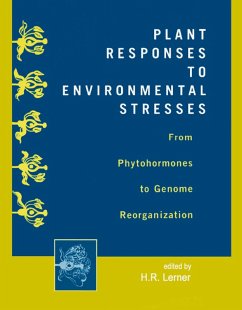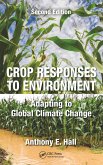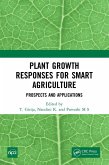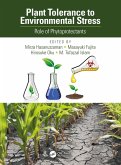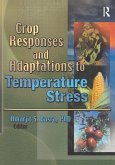H. R. Lerner
Plant Responses to Environmental Stresses (eBook, PDF)
From Phytohormones to Genome Reorganization: From Phytohormones to Genome Reorganization
204,95 €
204,95 €
inkl. MwSt.
Sofort per Download lieferbar

102 °P sammeln
204,95 €
Als Download kaufen

204,95 €
inkl. MwSt.
Sofort per Download lieferbar

102 °P sammeln
Jetzt verschenken
Alle Infos zum eBook verschenken
204,95 €
inkl. MwSt.
Sofort per Download lieferbar
Alle Infos zum eBook verschenken

102 °P sammeln
H. R. Lerner
Plant Responses to Environmental Stresses (eBook, PDF)
From Phytohormones to Genome Reorganization: From Phytohormones to Genome Reorganization
- Format: PDF
- Merkliste
- Auf die Merkliste
- Bewerten Bewerten
- Teilen
- Produkt teilen
- Produkterinnerung
- Produkterinnerung

Bitte loggen Sie sich zunächst in Ihr Kundenkonto ein oder registrieren Sie sich bei
bücher.de, um das eBook-Abo tolino select nutzen zu können.
Hier können Sie sich einloggen
Hier können Sie sich einloggen
Sie sind bereits eingeloggt. Klicken Sie auf 2. tolino select Abo, um fortzufahren.

Bitte loggen Sie sich zunächst in Ihr Kundenkonto ein oder registrieren Sie sich bei bücher.de, um das eBook-Abo tolino select nutzen zu können.
Emphasizing the unpredictable nature of plant behaviour under stress and in relation to complex interactions of biological pathways, this work covers the versatility of plants in adapting to environmental change. It analyzes environmentally triggered adaptions in developmental programmes of plants that lead to permanent, heritable DNA modifications.
- Geräte: PC
- ohne Kopierschutz
- eBook Hilfe
- Größe: 371.1MB
Andere Kunden interessierten sich auch für
![Crop Responses to Environment (eBook, PDF) Crop Responses to Environment (eBook, PDF)]() Anthony E. HallCrop Responses to Environment (eBook, PDF)48,95 €
Anthony E. HallCrop Responses to Environment (eBook, PDF)48,95 €![Plant Growth Responses for Smart Agriculture (eBook, PDF) Plant Growth Responses for Smart Agriculture (eBook, PDF)]() Plant Growth Responses for Smart Agriculture (eBook, PDF)54,95 €
Plant Growth Responses for Smart Agriculture (eBook, PDF)54,95 €![Plant Tolerance to Environmental Stress (eBook, PDF) Plant Tolerance to Environmental Stress (eBook, PDF)]() Plant Tolerance to Environmental Stress (eBook, PDF)49,95 €
Plant Tolerance to Environmental Stress (eBook, PDF)49,95 €![Crop Reactions To Water And Temperature Stresses In Humid, Temperate Climates (eBook, PDF) Crop Reactions To Water And Temperature Stresses In Humid, Temperate Climates (eBook, PDF)]() Paul J KramerCrop Reactions To Water And Temperature Stresses In Humid, Temperate Climates (eBook, PDF)42,95 €
Paul J KramerCrop Reactions To Water And Temperature Stresses In Humid, Temperate Climates (eBook, PDF)42,95 €![Crop Responses and Adaptations to Temperature Stress (eBook, PDF) Crop Responses and Adaptations to Temperature Stress (eBook, PDF)]() Crop Responses and Adaptations to Temperature Stress (eBook, PDF)65,95 €
Crop Responses and Adaptations to Temperature Stress (eBook, PDF)65,95 €![Molecular Host Plant Resistance to Pests (eBook, PDF) Molecular Host Plant Resistance to Pests (eBook, PDF)]() Molecular Host Plant Resistance to Pests (eBook, PDF)66,95 €
Molecular Host Plant Resistance to Pests (eBook, PDF)66,95 €![Multiple Stresses in Ecosystems (eBook, PDF) Multiple Stresses in Ecosystems (eBook, PDF)]() Joseph J. Cech Jr.Multiple Stresses in Ecosystems (eBook, PDF)66,95 €
Joseph J. Cech Jr.Multiple Stresses in Ecosystems (eBook, PDF)66,95 €-
-
-
Emphasizing the unpredictable nature of plant behaviour under stress and in relation to complex interactions of biological pathways, this work covers the versatility of plants in adapting to environmental change. It analyzes environmentally triggered adaptions in developmental programmes of plants that lead to permanent, heritable DNA modifications.
Dieser Download kann aus rechtlichen Gründen nur mit Rechnungsadresse in A, B, BG, CY, CZ, D, DK, EW, E, FIN, F, GR, HR, H, IRL, I, LT, L, LR, M, NL, PL, P, R, S, SLO, SK ausgeliefert werden.
Produktdetails
- Produktdetails
- Verlag: Taylor & Francis eBooks
- Seitenzahl: 750
- Erscheinungstermin: 27. April 2018
- Englisch
- ISBN-13: 9781351424103
- Artikelnr.: 56835545
- Verlag: Taylor & Francis eBooks
- Seitenzahl: 750
- Erscheinungstermin: 27. April 2018
- Englisch
- ISBN-13: 9781351424103
- Artikelnr.: 56835545
- Herstellerkennzeichnung Die Herstellerinformationen sind derzeit nicht verfügbar.
H.R. Lerner
General concepts: introduction to the response of plants to environmental
stresses; the importance of individuality; plant cell wall modifications
induced by adaptation to growth on the herbicide 2,6-dichlorobenzonitrile;
gene switches and stress management -modulation of gene expression by
transcription factors; stressful lifestyle-associated mutation in
microorganisms; differentiation of vegetative anabaena cells into
nitrogen-fixing heterocysts; genetic and epigenetic instability in tissue
culture and regenerated progenies; the environment as an active generator
of adaptive genomic variation; the effects of environmental stress on
repetitive DNA behaviour in plants; plant evolution - towards an adaptive
theory; oxidative stress as a regulator of environmental responses in
plants; the alternative oxidase - is it a respiratory pathway allowing a
plant to cope with stress? role of phytohormones in plant responses to
stresses; regulation of gene expression by abscisic acid during
environmental stress; abscisic acid - a long distance stress signal in
salt-stressed plants. Plant responses to particular stresses or
interactions with other organisms or viruses: metabolic aspects of
phosphate starvation response in plants; the response of plants to oxygen
deprivation - role of enzyme induction in the improvement of tolerance to
anoxia; some effects of environmental factors on the acquisition of
inorganic ions by higher plants; involvement of the cell wall in response
to water deficit and flooding; stimulated shoot elongation - a mechanism of
semiaquatic plants to avoid submergence stress; adaptation of the
photosynthetic apparatus to stress conditions; root impedance - sensing,
signalling, and physiological effects; the influence of temperature
extremes on gene expression, genomic structure, and the evolution of
induced tolerance in plants; regulation of g-aminobutyrate-synthesizing
enzyme, glutamate decarboxylase, by calcium/calmodulin - a mechanism for
rapid activation in response to stress; plant desiccation; evolutionary
consequences of transition to a lichen symbolic state and physiological
adaptation of oxidative damage associated with poikilohydry; the
involvement of flavonoids, nod factors, and phytohormones in nodulation;
conifer chemical defenses against bark beetles - the modulation of
monoterpene biosynthesis by wounding, environmental stress and ethylene;
plant responses to pathogens; viral pathogens and host plants interactions
- mutual survival.
stresses; the importance of individuality; plant cell wall modifications
induced by adaptation to growth on the herbicide 2,6-dichlorobenzonitrile;
gene switches and stress management -modulation of gene expression by
transcription factors; stressful lifestyle-associated mutation in
microorganisms; differentiation of vegetative anabaena cells into
nitrogen-fixing heterocysts; genetic and epigenetic instability in tissue
culture and regenerated progenies; the environment as an active generator
of adaptive genomic variation; the effects of environmental stress on
repetitive DNA behaviour in plants; plant evolution - towards an adaptive
theory; oxidative stress as a regulator of environmental responses in
plants; the alternative oxidase - is it a respiratory pathway allowing a
plant to cope with stress? role of phytohormones in plant responses to
stresses; regulation of gene expression by abscisic acid during
environmental stress; abscisic acid - a long distance stress signal in
salt-stressed plants. Plant responses to particular stresses or
interactions with other organisms or viruses: metabolic aspects of
phosphate starvation response in plants; the response of plants to oxygen
deprivation - role of enzyme induction in the improvement of tolerance to
anoxia; some effects of environmental factors on the acquisition of
inorganic ions by higher plants; involvement of the cell wall in response
to water deficit and flooding; stimulated shoot elongation - a mechanism of
semiaquatic plants to avoid submergence stress; adaptation of the
photosynthetic apparatus to stress conditions; root impedance - sensing,
signalling, and physiological effects; the influence of temperature
extremes on gene expression, genomic structure, and the evolution of
induced tolerance in plants; regulation of g-aminobutyrate-synthesizing
enzyme, glutamate decarboxylase, by calcium/calmodulin - a mechanism for
rapid activation in response to stress; plant desiccation; evolutionary
consequences of transition to a lichen symbolic state and physiological
adaptation of oxidative damage associated with poikilohydry; the
involvement of flavonoids, nod factors, and phytohormones in nodulation;
conifer chemical defenses against bark beetles - the modulation of
monoterpene biosynthesis by wounding, environmental stress and ethylene;
plant responses to pathogens; viral pathogens and host plants interactions
- mutual survival.
General concepts: introduction to the response of plants to environmental
stresses; the importance of individuality; plant cell wall modifications
induced by adaptation to growth on the herbicide 2,6-dichlorobenzonitrile;
gene switches and stress management -modulation of gene expression by
transcription factors; stressful lifestyle-associated mutation in
microorganisms; differentiation of vegetative anabaena cells into
nitrogen-fixing heterocysts; genetic and epigenetic instability in tissue
culture and regenerated progenies; the environment as an active generator
of adaptive genomic variation; the effects of environmental stress on
repetitive DNA behaviour in plants; plant evolution - towards an adaptive
theory; oxidative stress as a regulator of environmental responses in
plants; the alternative oxidase - is it a respiratory pathway allowing a
plant to cope with stress? role of phytohormones in plant responses to
stresses; regulation of gene expression by abscisic acid during
environmental stress; abscisic acid - a long distance stress signal in
salt-stressed plants. Plant responses to particular stresses or
interactions with other organisms or viruses: metabolic aspects of
phosphate starvation response in plants; the response of plants to oxygen
deprivation - role of enzyme induction in the improvement of tolerance to
anoxia; some effects of environmental factors on the acquisition of
inorganic ions by higher plants; involvement of the cell wall in response
to water deficit and flooding; stimulated shoot elongation - a mechanism of
semiaquatic plants to avoid submergence stress; adaptation of the
photosynthetic apparatus to stress conditions; root impedance - sensing,
signalling, and physiological effects; the influence of temperature
extremes on gene expression, genomic structure, and the evolution of
induced tolerance in plants; regulation of g-aminobutyrate-synthesizing
enzyme, glutamate decarboxylase, by calcium/calmodulin - a mechanism for
rapid activation in response to stress; plant desiccation; evolutionary
consequences of transition to a lichen symbolic state and physiological
adaptation of oxidative damage associated with poikilohydry; the
involvement of flavonoids, nod factors, and phytohormones in nodulation;
conifer chemical defenses against bark beetles - the modulation of
monoterpene biosynthesis by wounding, environmental stress and ethylene;
plant responses to pathogens; viral pathogens and host plants interactions
- mutual survival.
stresses; the importance of individuality; plant cell wall modifications
induced by adaptation to growth on the herbicide 2,6-dichlorobenzonitrile;
gene switches and stress management -modulation of gene expression by
transcription factors; stressful lifestyle-associated mutation in
microorganisms; differentiation of vegetative anabaena cells into
nitrogen-fixing heterocysts; genetic and epigenetic instability in tissue
culture and regenerated progenies; the environment as an active generator
of adaptive genomic variation; the effects of environmental stress on
repetitive DNA behaviour in plants; plant evolution - towards an adaptive
theory; oxidative stress as a regulator of environmental responses in
plants; the alternative oxidase - is it a respiratory pathway allowing a
plant to cope with stress? role of phytohormones in plant responses to
stresses; regulation of gene expression by abscisic acid during
environmental stress; abscisic acid - a long distance stress signal in
salt-stressed plants. Plant responses to particular stresses or
interactions with other organisms or viruses: metabolic aspects of
phosphate starvation response in plants; the response of plants to oxygen
deprivation - role of enzyme induction in the improvement of tolerance to
anoxia; some effects of environmental factors on the acquisition of
inorganic ions by higher plants; involvement of the cell wall in response
to water deficit and flooding; stimulated shoot elongation - a mechanism of
semiaquatic plants to avoid submergence stress; adaptation of the
photosynthetic apparatus to stress conditions; root impedance - sensing,
signalling, and physiological effects; the influence of temperature
extremes on gene expression, genomic structure, and the evolution of
induced tolerance in plants; regulation of g-aminobutyrate-synthesizing
enzyme, glutamate decarboxylase, by calcium/calmodulin - a mechanism for
rapid activation in response to stress; plant desiccation; evolutionary
consequences of transition to a lichen symbolic state and physiological
adaptation of oxidative damage associated with poikilohydry; the
involvement of flavonoids, nod factors, and phytohormones in nodulation;
conifer chemical defenses against bark beetles - the modulation of
monoterpene biosynthesis by wounding, environmental stress and ethylene;
plant responses to pathogens; viral pathogens and host plants interactions
- mutual survival.
